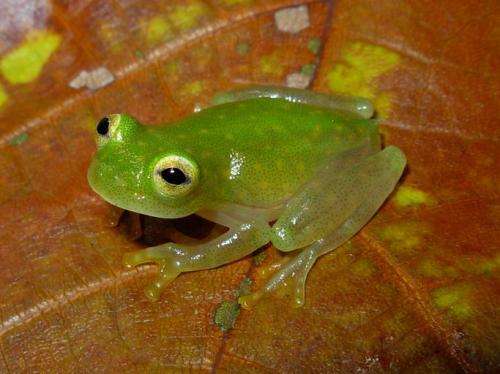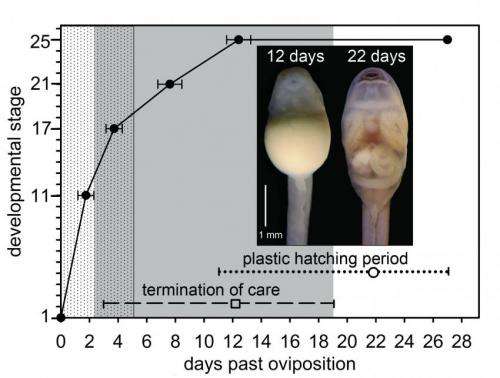April 30, 2014 report
Field study shows glassfrog embryos hatch early if not well cared for by parent

(Phys.org) —A trio of researchers has found that glassfrogs (Hyalinobatrachium fleischmanni) tend to hatch early if their male parent doesn't keep them hydrated. In their paper published in Proceedings of the Royal Society B: Biological Sciences, the team describes how they studied glassfrogs in the wild and what happened when they removed some of the males to see how the embryos would respond.
Glassfrogs live in Central and South America—they get their name from their translucent skin. Another of their interesting characteristics is that it's the males that brood the eggs, which are laid by the females on the underside of tree leaves. The male's job is to fertilize the eggs, of course, but also to sop up water then sit or lay on the eggs to allow the water to seep into them, keeping them hydrated. But, as it turns out, some of the males do a lot better job of it than others, which in turn causes the developing embryo to hatch earlier if need be.
Nature is full of examples of animals hatching early or late depending on environmental conditions, but until now, none had been found that do so in response to parental care. The team, working in a field in Mexico, were studying glassfrogs in general and decided to see what would happen if males were taken away from their duties attending to the eggs. The removed 40 fathers from their wards at different time intervals (from two to eight days after the eggs were laid) and then noted when the eggs hatched. They found that the embryos hatched on average 21 percent earlier in the absence of fatherly care (as compared to a control group of 50 other frogs under observation that tended their eggs). They also found that the embryos were likely to hatch on average 34 percent earlier if the weather was dry. More specifically, the team found that if the father abandoned the eggs after just two days, all the embryos died. But if the father tended to his duties for 3 to 8 days, the embryos not only survived, but hatched 12 days earlier than those in the control group.

The early hatching frogs did not mature any faster and survived by continuing to eat the yolks from their egg sacks. The work suggests the embryos are able to somehow understand their situation and to take action if necessary to ensure their own survival.
More information: Glassfrog embryos hatch early after parental desertion, Proceedings of the Royal Society B, Published 30 April 2014. DOI: 10.1098/rspb.2013.3237
Abstract
Both parental care and hatching plasticity can improve embryo survival. Research has found that parents can alter hatching time owing to a direct effect of care on embryogenesis or via forms of care that cue the hatching process. Because parental care alters conditions critical for offspring development, hatching plasticity could allow embryos to exploit variation in parental behaviour. However, this interaction of parental care and hatching plasticity remains largely unexplored. We tested the hypothesis that embryos hatch early to cope with paternal abandonment in the glassfrog Hyalinobatrachium fleischmanni (Centrolenidae). We conducted male-removal experiments in a wild population, and examined embryos' response to conditions with and without fathers. Embryos hatched early when abandoned, but extended development in the egg stage when fathers continued care. Paternal care had no effect on developmental rate. Rather, hatching plasticity was due to embryos actively hatching at different developmental stages, probably in response to deteriorating conditions without fathers. Our experimental results are supported by a significant correlation between the natural timing of abandonment and hatching in an unmanipulated population. This study demonstrates that embryos can respond to conditions resulting from parental abandonment, and provides insights into how variation in care can affect selection on egg-stage adaptations.
Journal information: Proceedings of the Royal Society B
© 2014 Phys.org


















